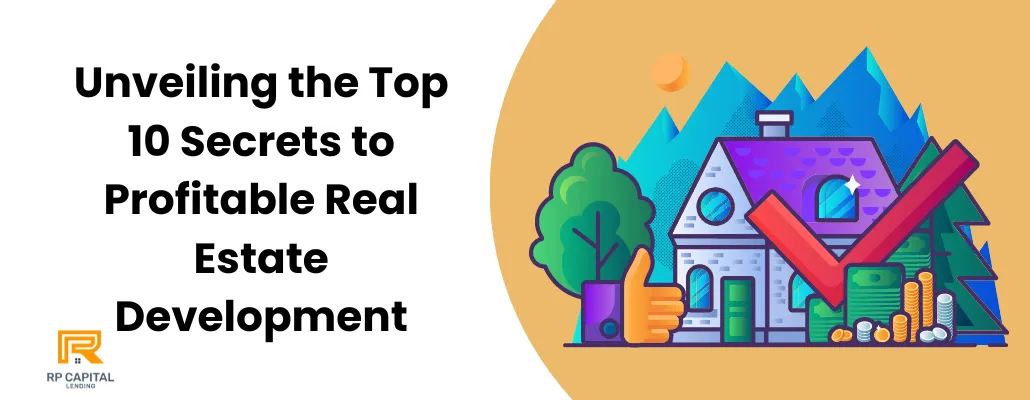Blog

Unveiling the Top 10 Secrets to Profitable Real Estate Development
"Unlock the hidden potential in every property!" This might sound like a developer's dream, but it's more than possible with the right approach. Real estate development is a dynamic and potentially lucrative field, yet it's riddled with complexities and challenges. As an experienced content writer in this domain, I've witnessed firsthand the high rewards and risks involved. In this comprehensive guide, I'll share insider tips to help you maximize your profitability in real estate development.
1. Research and Understand Your Market
Effective real estate development begins with a deep understanding of your market. This involves analyzing demographic trends, economic indicators, and consumer behaviors in your target area. It's not just about the current state of the market but predicting future trends as well. For example, a neighborhood might currently be underdeveloped but showing signs of emerging as a trendy spot. By identifying these patterns early, you can anticipate demand and tailor your projects accordingly. This approach ensures your development aligns with market needs, enhancing its appeal and potential for profitability.
2. Optimize Your Financing Strategy
Financing is the lifeblood of real estate development, and optimizing it is crucial for maximizing profits. This means exploring a variety of financing avenues, including bank loans, investor funding, and joint ventures. Each option comes with its own set of risks and benefits, and understanding these is key to making an informed decision. Additionally, effective cash flow management is vital to ensure you have the resources needed at every stage of the project. Choosing the right financing model can significantly reduce financial strain and increase the overall return on investment.
3. Location, Location, Location
The importance of location in real estate development cannot be overstated. It's about more than just finding a piece of land; it's about understanding the potential of a location. Look for areas with positive growth indicators like upcoming infrastructure projects, growing job markets, or increasing population density. A good location should also offer accessibility to key amenities like schools, hospitals, and shopping centers. A strategically chosen location not only attracts buyers or tenants but can also significantly appreciate in value over time, contributing to higher profits.
4. Prioritize Quality and Innovation
In a market saturated with options, quality and innovation make your project stand out. Investing in high-quality materials and superior craftsmanship ensures durability and appeal, thereby attracting discerning buyers. Furthermore, integrating innovative technologies, like smart home features or sustainable building practices, can make your development more attractive to a modern audience. These features not only enhance the living experience but can also lead to energy savings and environmental benefits, making your property a preferred choice for environmentally conscious consumers.
5. Understand and Comply with Regulations
Compliance with local regulations is essential for the smooth execution of any real estate project. This involves understanding and adhering to zoning laws, building codes, and environmental regulations. Failure to comply can lead to legal complications, project delays, and additional costs, severely impacting profitability. Additionally, staying compliant enhances the credibility and reputation of your development, which is critical for long-term success in the industry. It’s important to work closely with legal experts and local authorities to ensure that all aspects of your project meet the necessary standards.
6. Effective Project Management
Effective project management is crucial for keeping a real estate development project on schedule and within budget. This involves meticulous planning, resource allocation, and coordination among various stakeholders like architects, contractors, and suppliers. Using project management tools can help in tracking progress and identifying potential issues early. It's also essential to maintain clear communication channels and foster a collaborative environment. By efficiently managing the project, you can avoid costly delays and overruns, thereby safeguarding your profit margins.
7. Marketing and Sales Strategies
A well-planned marketing strategy is key to the successful sale of any real estate project. It involves identifying your target audience and employing the right mix of marketing channels to reach them. This could include online marketing, such as social media and email campaigns, as well as traditional methods like billboards and print advertisements. Effective branding and storytelling about your project can also create a unique identity and emotional connection with potential buyers. A strong marketing and sales plan ensures that your project gains maximum visibility and appeal, leading to faster sales and better profitability.
8. Foster Relationships
In real estate development, building and maintaining strong relationships with various stakeholders is invaluable. This includes local communities, business partners, government authorities, and financial institutions. Positive relationships can lead to smoother project approvals, potential collaborations, and insider market insights. Engaging with the local community, in particular, can enhance the public image of your development and lead to greater acceptance and support. Strong professional networks also open up new opportunities and resources, which are essential for the growth and success of your real estate ventures.
9. Stay Adaptable and Informed
The real estate market is dynamic, with constant changes and new trends emerging. Staying informed about these developments is crucial for making timely and effective decisions. This includes keeping an eye on economic conditions, market demand shifts, and advancements in building technology. Being adaptable allows you to adjust your strategies in response to market changes, which can be the difference between success and failure. Regularly updating your knowledge and approach ensures that your real estate projects remain relevant and competitive in a fluctuating market.
10. Learn from Each Project
Every real estate development project is a learning experience. It's important to analyze each project after completion to understand what worked and what didn't. This could involve reviewing financial performance, sales success, and feedback from buyers or tenants. Learning from past projects helps you identify best practices and areas for improvement. Continuous learning and adaptation are essential for long-term success in real estate development. Each project offers valuable insights that can help refine your strategies and approaches, leading to better decision-making and increased profitability in future projects.
Conclusion: Building Your Real Estate Development Legacy
Real estate development is an exciting journey filled with opportunities and challenges. By employing these insider tips, you can navigate the complexities of the industry and maximize your profitability. Remember, every successful project adds to your legacy in the real estate world.
FAQs
1: What's the most important factor in real estate development?
Location remains the most critical factor, influencing demand and profitability.
2: How important is sustainability in real estate?
Very. Sustainable practices are increasingly demanded by consumers and can enhance long-term value.
3: Can technology impact real estate profitability?
A: Absolutely. Embracing technology can improve efficiency, reduce costs, and attract modern buyers.
4: What is the key to effective project management?
A: Coordinated teamwork and efficient use of project management tools are essential.
5: How significant is market research?
It's crucial. Understanding your market guides every decision, from location to design and pricing.
RP Capital Lending is a d.b.a of RP Capital Partners Inc (NMLS # 2469193) | Privacy Policy
Copyright © 2022. All Rights Reserved.
Disclaimer: Loans only apply to non-owner occupied properties. Rates, terms and conditions offered only to qualified borrowers, may vary upon loan product, deal structure, other applicable considerations, and are subject to change at any time without notice.

